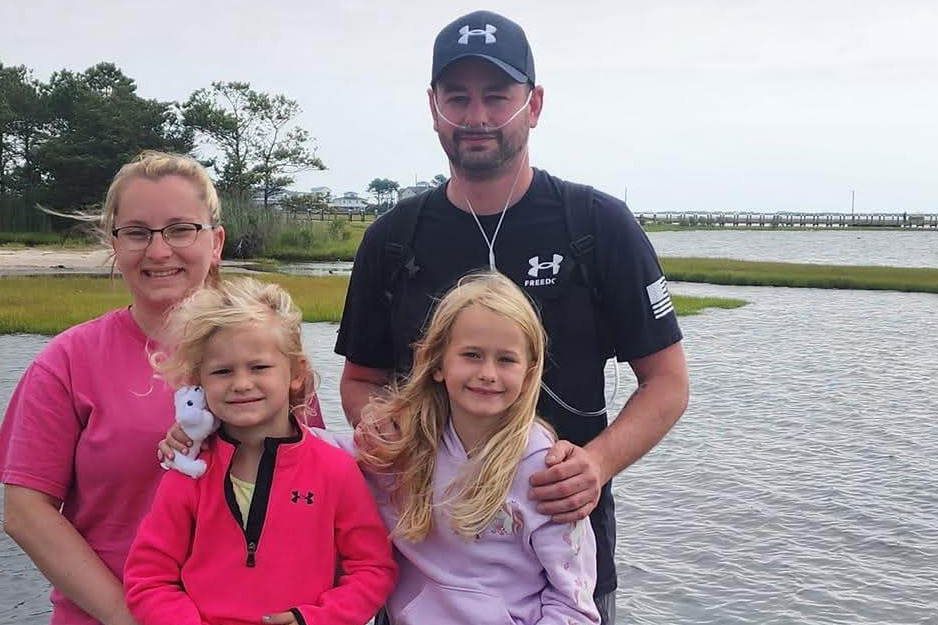A Fight for Life: Hope, Heart and Masonic Support
When Brother Ed Hoover, Lodge No. 364, Susquehanna, was diagnosed with idiopathic pulmonary fibrosis (IPF), a serious and incurable disease of the lungs, he wasn’t completely surprised. His father had passed away from the genetic disease and his sister underwent three double lung transplants. Other family members had also been diagnosed with both lung cancer and IPF.
Despite that knowledge, it didn’t make it any easier for Ed when he received his own diagnosis in 2018, at age 30. IPF affects the tissue surrounding the air sacs in the lungs. The lung tissue becomes thick and stiff for unknown reasons, causing scarring and making it difficult to breathe.
“It’s a disease that can kind of lay dormant,” Ed said. “They don’t test for it until later in life. Since I was about 19 or 20, I would get bad pneumonia. In 2018, X-rays showed that it wasn’t healing. They said with my family history, it would be a good idea to see a specialist. That’s when we discovered the disease and that I needed a double lung transplant.”
Ed was treated at Temple University Hospital for two years but started getting frustrated with the pre-evaluation process. At the time, he was working with the Masonic Blood + Organ Donor Program.
“Bill Soloway (the director) saw me starting to get upset, and he said maybe we should get a second opinion, which we did,” Ed said. “Within two months of transferring to the University of Pennsylvania hospital, they are ready to list me [for a double lung transplant].”
As of this publication, Ed was waiting for the call that the transplant is a go. He praised the Blood + Organ Donor Program for giving him a place stay (at Howie’s House) when he’s in Philadelphia. He also appreciates Bill accompanying him to doctors’ appointments.
“The fact that Bill has gone through a journey like this, he knows what I’m going through and can explain things to me,” he said.
“You’re taking in all this information, sitting there really scared and your mind is just not registering what the doctors are saying. Without Bill, it would have been hard to remember things and know what I’m supposed to do. He took notes and asked the right questions.”

It’s also important to have someone to talk to, because the transplant process can be incredibly isolating, Ed said.
“The whole process is like a roller coaster, and no matter how prepared you think you are, you’re not,” he said. “I’ve watched this happen to other family members, so I felt like a professional. But when you try to fight it yourself, it’s a different story. You’re never as ready as you thought you were.”
While several of his family members fought unsuccessful battles with IPF, Ed remains optimistic about his prognosis. He is grateful for the support of his girlfriend, Cortney, and his two daughters, Raelynn, 9, and Raegan, 6.
“They [the children] know that dad is very sick, but they don’t quite comprehend how sick I am,” he said.
Ed was employed up until December 2024 as a code enforcement officer for the city of Harrisburg. He returned to community college to earn an associate’s degree in business to prepare for the future. “I was hoping I’d be able to use that [degree] after surgery to be able to make decent money and support my family,” he explained.
Ed is still waiting for his disability benefits to be approved. It has been difficult mentally to deal with his current situation. He can’t go out and see people anymore, because he can’t risk getting sick. He’s not able to do a lot of activities with his children, because he gets easily winded. He’s on the maximum amount of oxygen he can be on at home, and it’s still not enough, he said.
As a Mason and a Tall Cedar, Ed said he has received tremendous support from his fellow Masons. In fact, he first learned about the Masonic Blood + Organ Donor Program through one of his brothers.
“When my dad was going through all of his terminal stuff, the town [Millersburg] did so much for my family,” Ed said. “They would put on fundraisers and help my mom at the house. I didn’t know how to repay them, so I decided to join the Masons because I knew they did a lot to contribute to the community and raise money for diseases, etc.”
Now it’s Ed’s turn to accept the help. He remains at home waiting for a possible transplant.
“I’m scared but excited. This procedure is the only thing that can take away the disease. I’m ready to be better.”
While Ed said he prays nobody needs to utilize the Masonic Blood + Organ Donor Program, he hopes the program never goes away because it has taken such a weight off his shoulders.
“If I have to reach out, I know someone will be there for me,” he said. “It’s a feeling that can’t be replaced.”
On April 30, 2025, Ed Hoover successfully received a double lung transplant. Read an update on his journey here.


